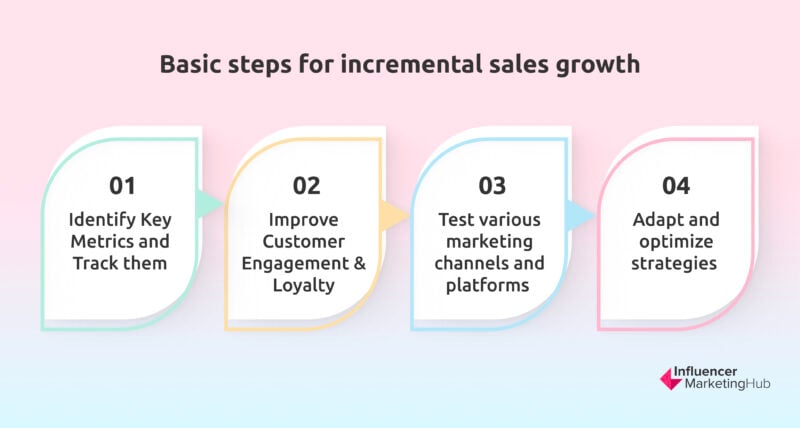Are you looking to increase your business revenue and drive growth? If so, it's time to shift your focus to incremental sales. Incremental sales refer to the additional revenue earned from customers who were not previously purchasing your products or services. In other words, it's the extra revenue generated from upselling or cross-selling to existing customers.
The importance of incremental sales lies in their ability to boost your business revenue without necessarily expanding your customer base. By tapping into new revenue streams from existing customers, you can increase profits and save on customer acquisition costs. Incremental sales can be a game-changer for your business, helping you to move from struggling to thriving.
So, if you want to take your business to the next level, it's time to prioritize incremental sales and maximize the lifetime value of your existing customer base.
Incremental sales can also improve customer retention and loyalty. By upselling or cross-selling, you can provide customers with a more personalized and valuable experience, which can make them more likely to come back to your business in the future. This not only increases their lifetime value but also turns them into brand advocates who can help you acquire new customers through word-of-mouth marketing.
So, if you're ready to take your business to the next level, read on to learn everything you need to know about incremental sales and unlock the power of your existing customer base.
- Defining Incremental Sales: What Does it Mean?
- How to Measure It: Incremental Sales Formula
- Incremental Sales Example
- Why it’s Important to Measure Incremental Sales
- Best Practices: Steps & Strategies
- Your Guide to Effective Strategies for Boosting Incremental Sales
- Final Thoughts
- Frequently Asked Questions
Defining Incremental Sales: What Does it Mean?
Incremental sales indicate the additional value of products or services sold during a tracked period of time, which goes beyond what a business would typically sell. This can occur due to a specific promotional activity, such as a marketing campaign, a sales promotion, or a product launch. Essentially, incremental sales represent the additional revenue generated by these activities over and above what the business would have generated without them.
In the highly competitive world, incremental sales play a vital role in driving revenue growth. Here are some reasons why:
- Cost-Effective: Upselling and cross-selling to existing customers is often cheaper than acquiring new ones. Incremental sales allow you to leverage your existing customer base and reduce customer acquisition costs.
- Improved Customer Retention: Upselling and cross-selling can improve customer satisfaction and loyalty. Satisfied customers are more likely to become repeat customers and recommend your business to others.
- Competitive Advantage: Incremental sales can give you a competitive advantage by increasing your market share and revenue.
In marketing and advertising, businesses often use “incrementality testing” to measure the impact of their campaigns and how many new customers and additional sales they bring in compared to their usual marketing strategy. Incrementality testing involves creating a control group, which is not exposed to the campaign, and a test group, which is exposed to the campaign. The results of these groups are compared to determine the impact of the campaign on incremental sales.
Incremental sales can also function as a key performance indicator (KPI) of marketing effectiveness. By comparing actual sales during a promotional period to promo-free sales expectations for that period, businesses can measure the financial performance of a dedicated marketing channel or sales campaign. This information can also be used to calculate the return on marketing investment.
How to Measure It: Incremental Sales Formula
The incremental sales formula is a simple calculation that businesses can use to measure the additional revenue generated from promotional activities or marketing campaigns. The formula for incremental sales is as follows:

Incremental Sales = Actual Sales During Promotional Period - Expected Sales Without Promotion
To use this formula, businesses must first determine their expected sales without the promotional activity or marketing campaign. This can be done by analyzing historical sales data or using sales forecasts based on market trends and seasonality.
Next, businesses must track their actual sales during the promotional period or marketing campaign. This can be done using sales data from point-of-sale systems, ecommerce platforms, or other sales tracking tools.
Once the expected sales and actual sales have been determined, businesses can use the incremental sales formula to calculate the additional revenue generated by the promotional activity or marketing campaign. This information can be used to determine the ROI of the promotional activity or marketing campaign, and to make data-driven decisions about how to allocate marketing resources in the future.
It's important to note that the incremental sales formula is just one tool that businesses can use to measure the effectiveness of their marketing and sales strategies. To get a more comprehensive understanding of how promotional activities and marketing campaigns impact sales, businesses should also track metrics such as customer acquisition cost, customer lifetime value, and conversion rates.
By using the incremental sales formula and other key metrics, businesses can gain a better understanding of what drives sales and how to optimize their marketing and sales strategies for maximum impact.
Incremental Sales Example
Let's consider a hypothetical example to illustrate how incremental sales can work in practice. Suppose a retail store wants to increase sales of its winter clothing items during the holiday season. The store decides to run a promotional campaign offering a discount of 15% on all winter clothing items for the entire month of December.
Before the campaign, the store sells an average of 500 winter clothing items per month. During the promotional period, the store sells a total of 750 winter clothing items, which includes 250 additional sales as a result of the promotion.
To calculate incremental sales, the store can use the formula:
Incremental Sales = Actual Sales During Promotional Period - Expected Sales Without Promotion
In this example, the expected sales without the promotion would be 500 winter clothing items. Therefore, the incremental sales would be:
Incremental Sales = 750 winter clothing items - 500 winter clothing items = 250 winter clothing items
Based on this calculation, the store can determine that the promotional campaign generated an additional 250 winter clothing item sales, which represents a significant increase in revenue. This information can be used to calculate the ROI of the promotional campaign and make data-driven decisions about future marketing and sales strategies.
Why it’s Important to Measure Incremental Sales
Measuring incremental sales is not just important, it's critical for businesses looking to optimize their marketing and sales strategies.
By understanding the impact of promotional activities and campaigns on incremental sales, businesses can make data-driven decisions to improve their revenue and profitability. For example, a study by McKinsey found that businesses that implemented targeted cross-selling strategies saw a 20% increase in sales.
Measuring incremental sales can also provide insights into customer behavior and preferences. By analyzing purchase patterns and customer behavior, businesses can gain a better understanding of what drives incremental sales and tailor their marketing and sales strategies accordingly. For instance, a business that discovers that a particular product line generates a significant amount of incremental sales may decide to increase its marketing and sales efforts for that product line.
In addition, measuring incremental sales can help businesses allocate their marketing resources more effectively. By determining which promotional activities and campaigns generate the most incremental sales, businesses can optimize their marketing strategies and increase their return on investment (ROI).
Overall, measuring incremental sales is a critical component of any successful business strategy. By analyzing data, making informed decisions, and optimizing marketing and sales strategies, businesses can drive growth, increase revenue and profitability, and gain a competitive advantage in the marketplace.
Best Practices: Steps & Strategies
Incremental sales are like puzzle pieces that can add up to a larger picture of business success. But how can businesses ensure they're fitting those puzzle pieces together effectively? By identifying key metrics, improving customer engagement and loyalty, testing out various marketing channels, and adapting and optimizing their strategies. By following these steps, businesses can unlock the potential for incremental sales growth and build a strong foundation for long-term success.

1. Identify Key Metrics and Track them
To effectively measure incremental sales, businesses need to determine which key performance indicators (KPIs) are relevant to their goals. These may include metrics such as customer acquisition cost, customer lifetime value, conversion rates, and average order value. By tracking and analyzing these metrics, businesses can identify which marketing and sales strategies are most effective at driving incremental sales and make data-driven decisions about how to allocate resources.
2. Improve Customer Engagement & Loyalty
Developing strong relationships with customers is key to unlocking incremental sales opportunities. By understanding customers' needs and preferences, businesses can tailor their marketing and sales strategies to provide a more personalized and valuable experience. This can include offering targeted promotions, personalized recommendations, and excellent customer service. By building trust and loyalty with customers, businesses can increase the likelihood of repeat purchases and positive word-of-mouth marketing.
3. Test various marketing channels and platforms
To maximize the impact of incremental sales strategies, businesses should experiment with different channels and platforms to reach their target audience. This may include social media marketing, email marketing, influencer marketing, or paid advertising. By testing out different approaches, businesses can identify which channels and platforms are most effective at driving incremental sales and allocate resources accordingly.
4. Adapt and optimize strategies
Incremental sales strategies are not set in stone, and businesses should be willing to make changes as needed. By tracking and analyzing performance metrics, businesses can identify areas for improvement and make adjustments to their marketing and sales strategies. This may include changing promotional tactics, targeting different customer segments, or refining product offerings. By continuously optimizing their approach, businesses can stay ahead of the competition and unlock new opportunities for incremental sales growth.
Your Guide to Effective Strategies for Boosting Incremental Sales
Now that you have a solid foundation of the key steps involved in boosting incremental sales, it's time to dive into some effective strategies that can take your business to the next level. By implementing these strategies, you can unlock new revenue streams, increase customer loyalty, and gain a competitive edge in your industry. So, let's explore some proven tactics that can help you achieve your incremental sales goals and drive sustainable growth for your business.

Upselling
Upselling is a powerful strategy for generating incremental sales by encouraging customers to upgrade their purchases. When executed correctly, upselling can lead to increased revenue and improved customer satisfaction. By offering customers a more advanced version of the product they are purchasing, businesses can tap into additional sales opportunities that may have otherwise gone untapped. This can be especially effective when the higher-priced option offers additional value to the customer, such as more features or a longer lifespan. By making it easy for customers to see the benefits of the upgraded option, businesses can create a win-win scenario where the customer gets a better product and the business earns a higher profit.
Cross-Selling
By suggesting complementary products or services to customers, businesses can enhance the customer's overall experience and provide added value. This strategy can also lead to increased revenue and improved customer loyalty. For example, a customer purchasing a laptop may not have considered purchasing a protective case or software, but by suggesting these items, the customer may see the added benefit and make the additional purchase. Additionally, cross-selling can lead to repeat business as customers appreciate the personalized and attentive service provided by the business.
Referral Programs
Referral programs can be an effective way to boost incremental sales while also expanding your customer base. By encouraging satisfied customers to refer their friends and family, you can increase your reach and generate new leads. Offering incentives such as discounts or rewards can further incentivize customers to spread the word about your business. Not only can this lead to new sales, but it can also improve customer loyalty as customers who refer others are more likely to feel a sense of investment in your business.
Targeted Marketing
Targeted marketing is a highly effective strategy to drive incremental sales as it allows businesses to reach out to customers who have already shown an interest in their products or services. By leveraging customer data such as purchase history, demographics, and browsing behavior, businesses can create targeted marketing campaigns that are more relevant and personalized to the individual customer. This not only increases the chances of making a sale, but also helps to improve customer satisfaction and loyalty. For example, if a customer has recently purchased a new phone, a targeted marketing campaign might suggest compatible accessories or a promotion for a new phone case. By providing these personalized recommendations, businesses can increase the likelihood of a customer making an additional purchase, leading to incremental sales growth.
Personalization
Personalization is a powerful strategy that can drive incremental sales by creating a more tailored and engaging customer experience. By leveraging customer data, businesses can provide product recommendations, promotions, and content that are highly relevant to each customer's unique preferences and interests. This not only increases the likelihood of making additional purchases, but also enhances customer satisfaction and loyalty. Personalization can also extend beyond product recommendations to include personalized communications, such as emails or messages, that make customers feel valued and understood. Overall, personalization is a key component of any successful incremental sales strategy.
Final Thoughts
In conclusion, incremental sales are crucial for businesses looking to stay competitive and grow. By focusing on strategies such as upselling, cross-selling, referral programs, targeted marketing, and personalization, businesses can unlock new opportunities for revenue growth and customer loyalty. By continuously tracking and analyzing performance metrics, businesses can optimize their approach and stay ahead of the competition. So, what are you waiting for? Start implementing these strategies today and see how incremental sales can help take your business to the next level. Remember, small improvements can lead to big results, so don't underestimate the power of incremental sales!
Frequently Asked Questions
What are incremental sales?
Incremental sales refer to the additional sales generated as a direct result of specific marketing activities or promotional campaigns. These sales go beyond the baseline sales that would have occurred without any marketing efforts, providing valuable insights into the effectiveness of marketing strategies.
Why is measuring incremental sales important for businesses?
Measuring incremental sales is crucial as it helps businesses evaluate the effectiveness of their marketing efforts, optimize resource allocation, and make informed decisions. By understanding which campaigns drive additional sales, companies can enhance their marketing strategies and improve ROI.
How can businesses track incremental sales effectively?
Businesses can track incremental sales by implementing key performance indicators (KPIs) such as customer acquisition cost, conversion rates, and average order value. Regularly analyzing these metrics helps in assessing the impact of marketing campaigns on sales growth.
What role does customer retention play in driving incremental sales?
Customer retention is vital for driving incremental sales as satisfied customers are more likely to make repeat purchases. Implementing loyalty programs, personalized offers, and excellent customer service can enhance retention and lead to increased incremental sales over time.
What is the difference between incremental sales and incremental revenue?
Incremental sales refer to the additional units sold due to marketing efforts, while incremental revenue focuses on the additional income generated from those sales. For example, if a campaign increases sales by 100 units, the incremental sales are 100, but the incremental revenue would depend on the price of those units.


